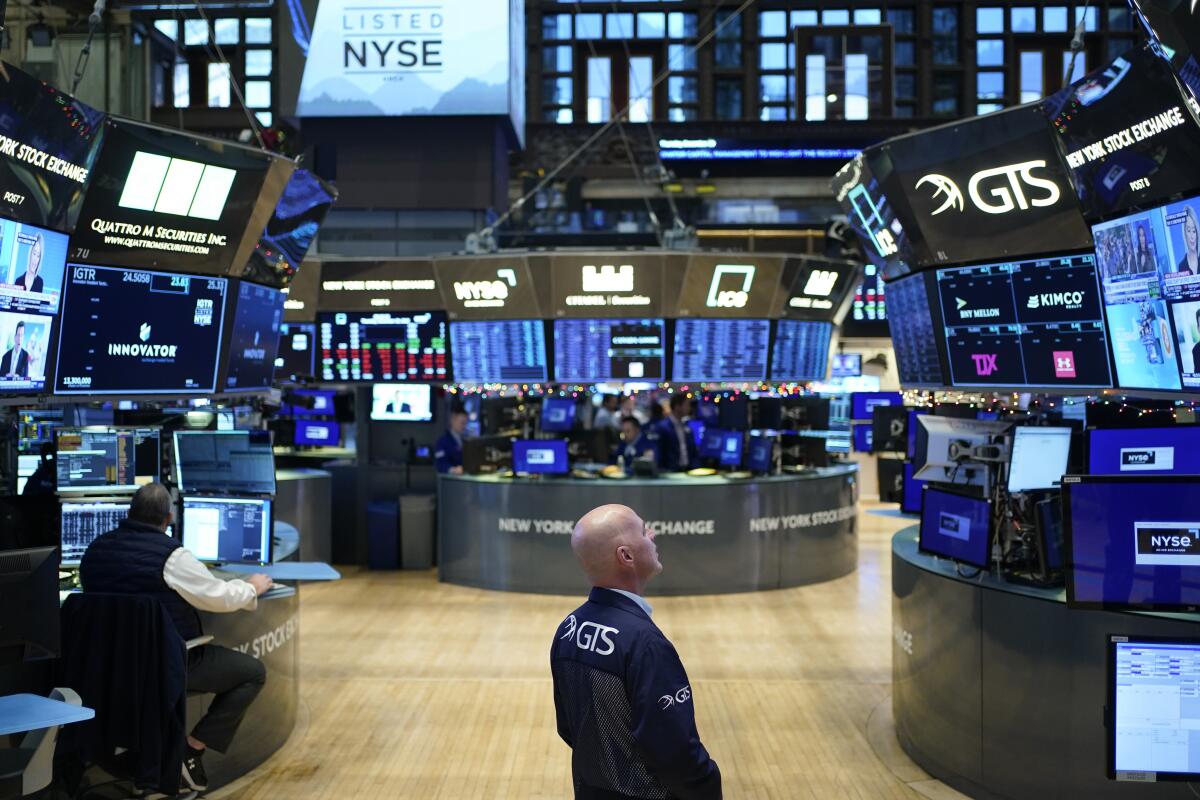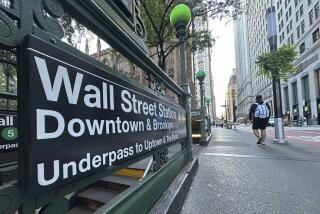Wall Street adds more to its big January after a strong week

A strong week for Wall Street closed out with modest gains Friday, sending the stock market to its highest level since early December.
The Standard & Poor’s 500 rose 0.2% to clinch its third winning week in the last four and was near its highest level since the summer, before fading at the end of the day. It has rallied through January on growing belief that inflation is on a steady downswing, hopefully leading to less pressure on the economy and markets.
The Dow Jones industrial average rose 28 points, or 0.1%, while the Nasdaq composite gained 0.9%.
Helping to lead the way was American Express, which jumped 10.5% despite reporting weaker profit and revenue for the latest quarter than expected. It gave a forecast for earnings through 2023 that topped Wall Street’s expectations and announced a planned increase to its dividend.
Another big gain for Tesla’s stock also supported the market. It rose 11% after its stronger-than-expected profit report for the end of 2022, released earlier in the week.
They helped offset a 6.4% loss for Intel after a jarring warning from the chipmaker. Not only did its revenue and earnings fall short of expectations last quarter, it also gave a forecast for revenue this quarter that was more than $2 billion below analysts’ expectations.
All told, the S&P 500 rose 10.13 points to 4,070.56. The Dow climbed 28.67 to 33,978.08, and the Nasdaq gained 109.30 to close at 11,621.71.
Hasbro fell 8.1% after saying it “underperformed” in the most recent holiday shopping season and will probably report a 17% drop in revenue for the fourth quarter. The company will cut about 1,000 jobs to reduce costs.
So far, the job market has remained remarkably resilient despite a slowing overall economy. Almost all of the high-profile layoff announcements have been within the tech industry, which had raced to expand after the pandemic sent demand for technology soaring.
As tech giants lay off scores of workers amid a sector-wide downturn, employees who once considered the Silicon Valley companies a safe long-term bet are reconsidering their allegiances.
Earnings reporting season is entering its heart, and companies have been offering mixed results and forecasts. That has helped lead to some big swings in markets.
Two competing big ideas have been sending Wall Street veering up, down and back again recently. On one hand are worries about a steep drop-off in profits and a severe recession for the economy after all the interest rate increases the Fed has pushed through to crush inflation. On the other are hopes that cooling inflation may allow the Fed to take it easier on rates.
The market is partly trying to reconcile the notion that weak earnings and a drop in demand may be necessary for inflation to keep cooling, said Keith Buchanan, portfolio manager at Globalt Investments.
“It’s kind of like this is the medicine the economy has to take,” he said.
Economic reports on Friday backed up recent data points suggesting inflation continues to moderate. The measure that the Fed prefers, which strips out food and energy costs, was 4.4% higher in December than a year earlier. That was down from 4.7% in November and was equal to economists’ expectations.
Reports also showed that income growth for Americans slowed in December, while consumer spending fell off a bit faster than expected.
A separate report said U.S. consumers are also downshifting their expectations for inflation in the coming year. That’s key for the Fed, which wants to avoid a vicious cycle in which households expecting high inflation make moves that only make it worse.
Economists said Friday’s data probably keep the Fed on track to raise its key benchmark rate by 0.25 of a percentage point at its meeting next week. That would be a step down from its increase of 0.50 of a point last month and four straight hikes of 0.75 of a point before that.
Smaller increases would mean less added pressure on the economy, which has already seen damage done to the housing industry and other areas because of last year’s surge in rates.
The yield on the 10-year Treasury, which sets rates for mortgages and other important loans, held steady at 3.51%. The two-year yield, which moves more on expectations for Fed actions, held at 4.19%.
Next week could be another busy one for markets, with several high-profile events on top of the Fed’s announcement. The European Central Bank will give its latest decision on rates, the U.S. government will release its latest monthly check on the job market and more than 100 companies in the S&P 500 will report their quarterly results.
In stock markets overseas, India’s Sensex fell 1.5% as Adani Group was again hit by heavy selling. Shares in seven Adani companies have plunged this week, wiping out billions of dollars in market value, after short-selling firm Hindenburg Research said it was betting against the conglomerate, which has holdings in energy, data transmission, construction and other major industries.
Adani Group said it was considering legal action against Hindenburg after its allegations of stock market manipulation and accounting fraud.
AP business writers Yuri Kageyama and Matt Ott contributed to this report.
More to Read
Inside the business of entertainment
The Wide Shot brings you news, analysis and insights on everything from streaming wars to production — and what it all means for the future.
You may occasionally receive promotional content from the Los Angeles Times.











